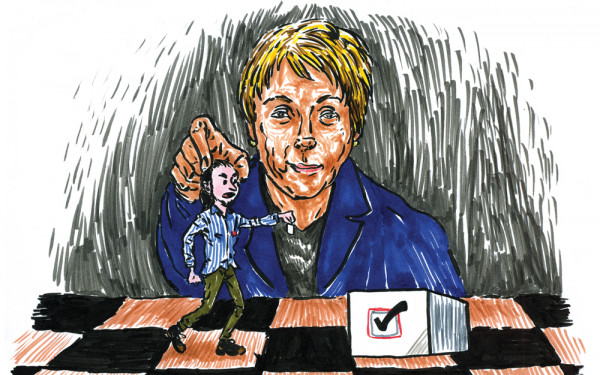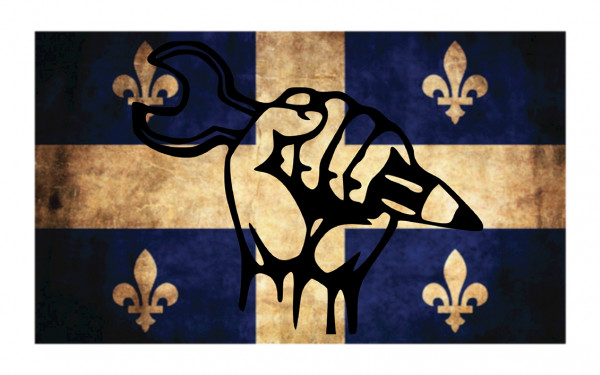PQ Passé
Whether you’re new to Quebec or not, it’s pretty obvious that the province’s politics works on two spectrums. While parties are judged on the scale of left vs. right, what often trumps this debate, in debates and commentary alike, is where a party sits on the federalist/sovereigntist spectrum.
And when I consider voting for a party with sovereigntist values to unseat Charest, I feel a twinge from my Ottawan upbringing, warning me I may be cutting off the nose to spite the face.
After living in Quebec for two years, however, it’s become clear to me that things aren’t so black and white. But what is clear is that the polarizing nature of the sovereignty debate is dangerous. It makes voting for the left impossible for anglophones with cold feet and has made the Parti Québécois the volatile giant it is now.
When the motion to separate was put to a vote 17 years ago, it was voted down by less than one percentage point. And while the push for sovereignty is quieter now, the PQ can’t afford to alienate the hardest of nationalists when it’s so close to regaining power from the Liberals.
Losing MNA Jean-Martin Aussant last year was a blow to the PQ’s separatist cred, intensified by the fact that ‘95 referendum-era premier Jacques Parizeau has now thrown his support behind him.
His new one-seat party Option Nationale aims for the heart of the sovereigntist cause, unmoved by the politics of soft nationalists the PQ needs to retain its size.
They can’t lose the sovereigntist base; it’s their bread and butter. It explains why the PQ will consider a referendum if only 15 per cent of Quebecers want it, in what Pauline Marois formerly called a politically binding citizen’s referendum.
The small parties campaigning on leftist values and Quebec national identity don’t have this pluralist problem yet. The PQ has to rally the worker vote, the left and sovereigntists hard and soft to get the majority they seek.
But here I am, sitting on the left, and trusting Marois is something I just can’t do.
In trying to prevent the hard nationalists from jumping to Option Nationale, Marois speaks of policy that only validates the stereotype of the xenophobic Québécois. And while the party’s social-service-friendly platform is attractive, they’ve subordinated it to preservation of culture—a decision that could drive the left to Québec Solidaire.
“The small parties campaigning on leftist values and Quebec national identity don’t have this pluralist problem yet. The PQ has to rally the worker vote, the left and sovereigntists hard and soft to get the majority they seek”
Because when Marois speaks of the Québécois, it has as much to do with race and religion as it does with language.
She was originally running on the platform that everyone wishing to run for public office would need a competence in French, but when she realized she had forgotten about First Nations communities, Marois changed this idea to only apply to immigrants.
Her party is running on the premise of secular government, but with the caveat that the crucifix is a cultural object—as if a hijab has nothing to do with culture.
And that’s perhaps the greatest indicator of the PQ problem: they need to keep their base and gain new support to win the majority, which means being the champion of Quebec’s history while immersing themselves into the social issues that will shape its future.
And, caught between the two, they haven’t managed to be heroes for either cause. What they do have going for them is their position as an alternative to Charest.
The international language of commerce is English, and barring its use in the workplace, like Marois has suggested, is a Custer’s Last Stand against the great tide of globalized business Quebec’s economy necessarily needs to interact with.
While a customer should always have the opportunity to be served in French, forcing the exclusive use of one language on the private sector veers far closer to oppression than a so-called progressive party should.
And while the PQ has spoken out against Charest’s tuition increases, there’s no guarantee Marois will be the friend to students, even if former student leader Léo Bureau-Blouin wins in his riding.
A majority PQ government would hold a “national discussion” on the subject according to Sainte-Marie—Saint-Jacques candidate Daniel Breton. Marois has been a fairweather friend to the students, illustrated by her wearing the red square only at the height of its popularity, and her quick separation from the movement when a fall election looked possible.
The provincial equivalent to the New Democratic Party, Québec Solidaire, has never wavered in its support for the printemps érable crusade against neoliberal politics, and co-leader Françoise David proved her competence in the Radio-Canada leader debate.
And, most importantly, while QS is explicitly pro-sovereignty, they acknowledge how imperative it is to fix what’s broken first, without blaming all Quebec’s woes on federalism.
They provide a solutions-based platform without harping on language politics. In a minority government, a QS bloc can go a long way towards looking out for the social welfare of the province—something that will be needed if Legault’s right-wing party winds up in third place.
You can vote for a party with intrinsically Québécois values for accessible healthcare, daycare, housing and tuition without selling out to separatism. That’s what your ballot in a referendum is for.

_2_846_846_90.jpg)

_1_600_375_90_s_c1.jpg)


